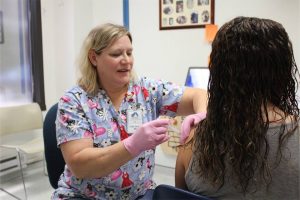Health officials: Get vaccine, flu outbreak not sparing anyone
By Dave Fidlin For Chronicle Media — January 16, 2018
Health centers across Central Illinois report most flu case they have treated are people who did not receive the vaccine. (Photo courtesy of McLean Co. Health Dept.)
We are into the cold, dark days of winter, and while flu season is an annual ritual, synonymous with plunging temperatures, this year’s strain hit Illinois fast, furious and earlier than anticipated.
The member agencies of the Northern Illinois Public Health Consortium (NIPHC) would like to advise residents that seasonal flu activity has increased sharply in recent weeks.
The Centers for Disease Control and Prevention (CDC) is reporting that influenza-like-illness activity is widespread across most of the country, including Illinois.
Latest surveillance data shows current activity in Illinois is similar to what was seen during the peak of the 2014-2015 season; the most severe in recent years. Seasonal influenza, or flu, is a contagious respiratory virus that can cause mild to severe illness.
While flu season is an annual ritual, synonymous with plunging temperatures, this year’s strain hit Illinois fast, furious and earlier than anticipated. It also claimed lives in Central Illinois in the weeks leading up to the holidays.
According to data from McLean County coroner Kathy Davis’ office, the three confirmed flu-related deaths occurred in mid-December. Victims ran across demographic groups and included a 25-year-old woman and an elderly person.
Sue Grant, community health services supervisor with the McLean County Health Department, said this year’s outbreak provides a teachable moment.
Speaking to the local victims of this year’s strain, Grant said, “There is no real reason, other than viruses can kill. Don’t always count on influenza being benign.”
Beyond the three deaths, this year’s strain is believed to have impacted swaths of people less severely, though some cases have involved hospitalizations.
Why this year’s virus has been harsher from prior years is unknown, though local experts do have theories, starting with the bone-chilling temperatures as December got underway. Winter weather likely prompted more people to stay indoors, which provided fertile ground for the virus to spread.
“I think this year has been more difficult because it hit us a lot earlier,” Grant said.
Also, Grant said, this year’s strain, associated with the H3N2 virus, has a recorded history of causing hospitalizations and death elsewhere.
While this year’s flu strain has caused surprises and disruption, it is not completely unexpected within the medical and health community.
Experts in the U.S. typically examine how the flu impacts persons in Australia during its winter season on the opposite end of the calendar year. Forecasting conditions in the land down under has helped develop the vaccines administered here.
“With our mobile society, it can spread very easily,” Grant said. “So, that’s what we’ve been watching.”
While not a required reportable disease in Illinois, the Illinois Department of Public Health nevertheless examines reports from local health departments.
Those include reports include, “physician offices, emergency departments, and other clinics that report acute illness with influenza-like illness, and institutional settings such as nursing homes and prisons that report outbreaks,” according to the IDPH.
The state then monitors disease trends and influenza activities as they occur on a weekly basis.
As of the last week of 2017, the flu outbreak in Illinois was categorized as widespread.
Still, experts are encouraging residents to get this year’s flu vaccine.
Paul Pedersen, vice president and chief medical officer with the OSF St. Joseph Medical Center in Bloomington, said the facility he works out of has treated at least 300 persons who have tested positive for the H3N2 virus.
Of those cases, Pedersen said 70 percent of the patients had not received a flu shot this year.
“One of the best things people can do now is get their flu shots,” Pedersen said. “It’s very accessible and is offered at a number of different places.”
Getting a flu shot is not foolproof against contracting the virus, though Pedersen said research has shown persons with the vaccine typically have less severe symptoms.
Another tip Pedersen offers the general public: Anyone with flu-like symptoms — including fever, body aches and a cough — is encouraged to see a physician as soon as possible so antiviral medications can be prescribed.
Some of the words of wisdom shared in years past hold true this year as well.
“If you’re sick, just stay home,” Pedersen said.
At-risk groups for the flu
According to the Centers for Disease Control:
- Children younger than 5, but especially children younger than 2 years old
- Adults 65 years of age and older
- Pregnant women (and women up to two weeks postpartum)
- Residents of nursing homes and other long-term care facilities
- American Indians and Alaskan Natives
- People who have certain chronic medical conditions, including:
* Asthma
* Neurological and neurodevelopmental conditions (including disorders of the brain, spinal cord, peripheral nerve, and muscle such as cerebral palsy, epilepsy [seizure disorders], stroke, intellectual disability [mental retardation], moderate to severe developmental delay, muscular dystrophy, or spinal cord injury)
* Chronic lung disease (such as chronic obstructive pulmonary disease [COPD] and cystic fibrosis)
* Heart disease (such as congenital heart disease, congestive heart failure and coronary artery disease)
* Blood disorders (such as sickle cell disease)
* Endocrine disorders (such as diabetes mellitus)
* Kidney disorders
* Liver disorders
* Metabolic disorders (such as inherited metabolic disorders and mitochondrial disorders)
* Weakened immune system due to disease or medication (such as people with HIV or AIDS, or cancer, or those on chronic steroids)
* People younger than 19 years of age who are receiving aspirin therapy
* People with extreme obesity (body mass index [BMI] of 40 or greater)
— Health officials: Get vaccine, flu outbreak not sparing anyone —



